宾语从句否定前移
- 格式:doc
- 大小:13.00 KB
- 文档页数:1
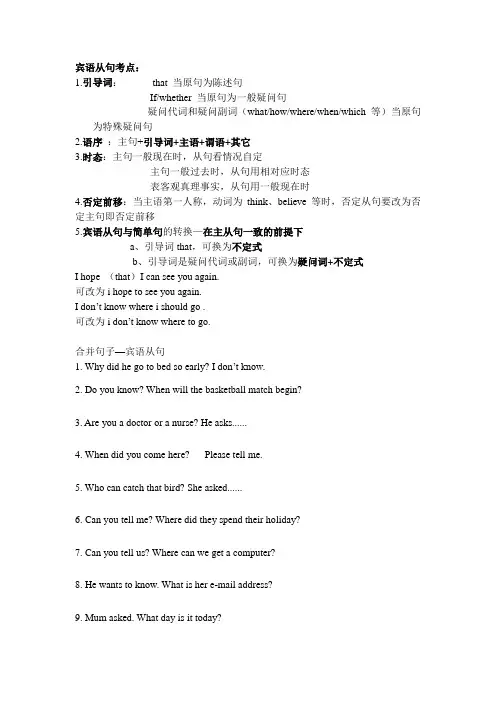
宾语从句考点:1.引导词:that 当原句为陈述句If/whether 当原句为一般疑问句疑问代词和疑问副词(what/how/where/when/which等)当原句为特殊疑问句2.语序:主句+引导词+主语+谓语+其它3.时态:主句一般现在时,从句看情况自定主句一般过去时,从句用相对应时态表客观真理事实,从句用一般现在时4.否定前移:当主语第一人称,动词为think、believe等时,否定从句要改为否定主句即否定前移5.宾语从句与简单句的转换—在主从句一致的前提下a、引导词that,可换为不定式b、引导词是疑问代词或副词,可换为疑问词+不定式I hope (that)I can see you again.可改为i hope to see you again.I don’t know where i should go .可改为i don’t know where to go.合并句子—宾语从句1. Why did he go to bed so early? I don’t know.2. Do you know? When will the basketball match begin?3. Are you a doctor or a nurse? He asks......4. When did you come here? Please tell me.5. Who can catch that bird? She asked......6. Can you tell me? Where did they spend their holiday?7. Can you tell us? Where can we get a computer?8. He wants to know. What is her e-mail address?9. Mum asked. What day is it today?10. He asked. Is it going to rain tomorrow?11. What will happen tomorrow? Nobody knows.12. What class are they in? He asked me.13. Does her father work in the factory? Could you tell me?14. The teacher says to us “You must get to school on time.”15. Will he come here tonight? I’m not sure.16. “I’m making a model train.” He said.17. Whose is that car? The policeman asked.18. Did the man pay for the meal? The boss asked the waiter.19. How is the weather like? She wanted to know.20. What are the children doing over there? The headmaster asked.把下列句子变成含有宾语从句的复合句。
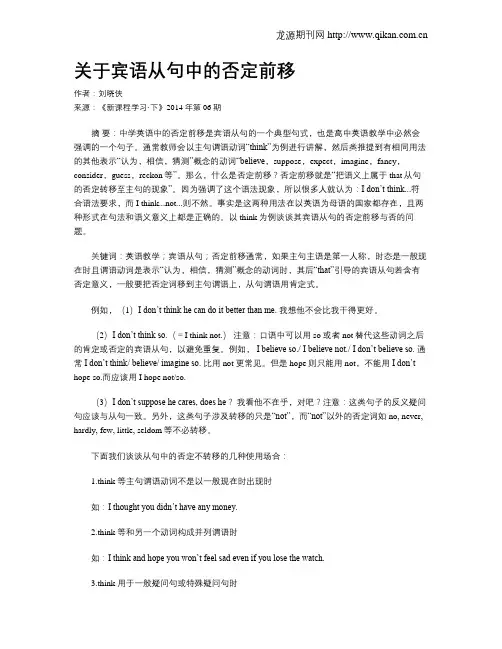
关于宾语从句中的否定前移作者:刘晓侠来源:《新课程学习·下》2014年第06期摘要:中学英语中的否定前移是宾语从句的一个典型句式,也是高中英语教学中必然会强调的一个句子。
通常教师会以主句谓语动词“think”为例进行讲解,然后类推提到有相同用法的其他表示“认为,相信,猜测”概念的动词“believe,suppose,expect,imagine,fancy,consider,guess,reckon等”。
那么,什么是否定前移?否定前移就是“把语义上属于that从句的否定转移至主句的现象”。
因为强调了这个语法现象,所以很多人就认为:I don’t think...符合语法要求,而I think...not...则不然。
事实是这两种用法在以英语为母语的国家都存在,且两种形式在句法和语义意义上都是正确的。
以think为例谈谈其宾语从句的否定前移与否的问题。
关键词:英语教学;宾语从句;否定前移通常,如果主句主语是第一人称,时态是一般现在时且谓语动词是表示“认为,相信,猜测”概念的动词时,其后“that”引导的宾语从句若含有否定意义,一般要把否定词移到主句谓语上,从句谓语用肯定式。
例如,(1)I don’t think he can do it better than me. 我想他不会比我干得更好。
(2)I don’t think so.(=I think not.)注意:口语中可以用so 或者not替代这些动词之后的肯定或否定的宾语从句,以避免重复。
例如,I believe so./ I believe not./ I don’t believe so. 通常I don’t think/ believe/ imagine so.比用not 更常见。
但是hope则只能用not,不能用I don’t hope so.而应该用I hope not/so.(3)I don’t suppose he cares, does he?我看他不在乎,对吧?注意:这类句子的反义疑问句应该与从句一致。
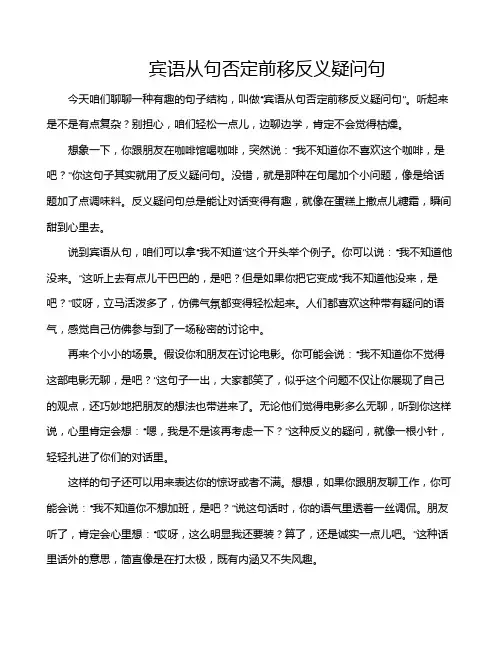
宾语从句否定前移反义疑问句今天咱们聊聊一种有趣的句子结构,叫做“宾语从句否定前移反义疑问句”。
听起来是不是有点复杂?别担心,咱们轻松一点儿,边聊边学,肯定不会觉得枯燥。
想象一下,你跟朋友在咖啡馆喝咖啡,突然说:“我不知道你不喜欢这个咖啡,是吧?”你这句子其实就用了反义疑问句。
没错,就是那种在句尾加个小问题,像是给话题加了点调味料。
反义疑问句总是能让对话变得有趣,就像在蛋糕上撒点儿糖霜,瞬间甜到心里去。
说到宾语从句,咱们可以拿“我不知道”这个开头举个例子。
你可以说:“我不知道他没来。
”这听上去有点儿干巴巴的,是吧?但是如果你把它变成“我不知道他没来,是吧?”哎呀,立马活泼多了,仿佛气氛都变得轻松起来。
人们都喜欢这种带有疑问的语气,感觉自己仿佛参与到了一场秘密的讨论中。
再来个小小的场景。
假设你和朋友在讨论电影。
你可能会说:“我不知道你不觉得这部电影无聊,是吧?”这句子一出,大家都笑了,似乎这个问题不仅让你展现了自己的观点,还巧妙地把朋友的想法也带进来了。
无论他们觉得电影多么无聊,听到你这样说,心里肯定会想:“嗯,我是不是该再考虑一下?”这种反义的疑问,就像一根小针,轻轻扎进了你们的对话里。
这样的句子还可以用来表达你的惊讶或者不满。
想想,如果你跟朋友聊工作,你可能会说:“我不知道你不想加班,是吧?”说这句话时,你的语气里透着一丝调侃。
朋友听了,肯定会心里想:“哎呀,这么明显我还要装?算了,还是诚实一点儿吧。
”这种话里话外的意思,简直像是在打太极,既有内涵又不失风趣。
而且呀,这种句子不仅仅适合朋友之间,有时候在工作中也能派上用场。
比如说,你在开会时,可以说:“我不知道大家不觉得这个方案不错,是吧?”这话一出口,气氛瞬间变得轻松,大家都知道你是在调侃,仿佛一切压力都被抛到了九霄云外。
工作嘛,忙归忙,咱们也要找乐子。
咱们得注意语气。
太认真了可就不对劲儿了,要让它听起来自然,像聊天一样。
试想,如果你一脸严肃地说:“我不知道你不喜欢这个设计,是吧?”那感觉简直像是在审问人,谁会喜欢呢?所以啊,轻松的语气,偶尔的笑声,才能让反义疑问句发挥最大的魅力。
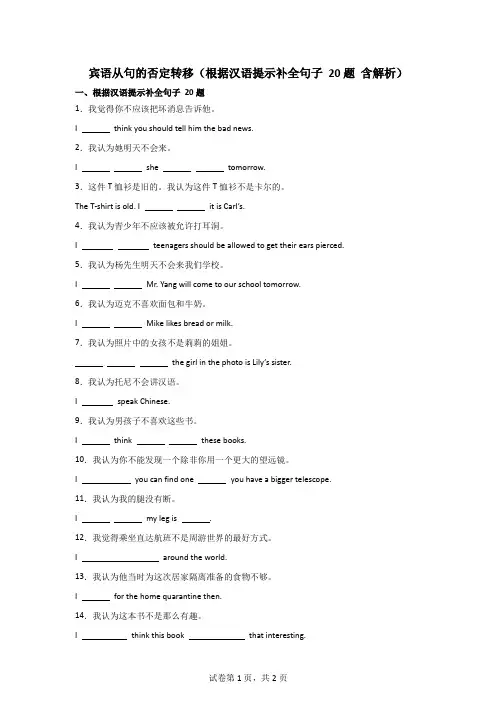
宾语从句的否定转移(根据汉语提示补全句子20题含解析)一、根据汉语提示补全句子20题1.我觉得你不应该把坏消息告诉他。
I think you should tell him the bad news.2.我认为她明天不会来。
I she tomorrow.3.这件T恤衫是旧的。
我认为这件T恤衫不是卡尔的。
The T-shirt is old. I it is Carl’s.4.我认为青少年不应该被允许打耳洞。
I teenagers should be allowed to get their ears pierced.5.我认为杨先生明天不会来我们学校。
I Mr. Yang will come to our school tomorrow.6.我认为迈克不喜欢面包和牛奶。
I Mike likes bread or milk.7.我认为照片中的女孩不是莉莉的姐姐。
the girl in the photo is Lily’s sister.8.我认为托尼不会讲汉语。
I speak Chinese.9.我认为男孩子不喜欢这些书。
I think these books.10.我认为你不能发现一个除非你用一个更大的望远镜。
I you can find one you have a bigger telescope.11.我认为我的腿没有断。
I my leg is .12.我觉得乘坐直达航班不是周游世界的最好方式。
I around the world.13.我认为他当时为这次居家隔离准备的食物不够。
I for the home quarantine then.14.我认为这本书不是那么有趣。
I think this book that interesting.15.我认为这对那个男孩来说不会是个惊喜。
it’ll be a surprise for that boy.16.我认为3D打印不会破坏环境,是吗?I 3D printing will destroy the environment, ? 17.我们认为那部电影不适合儿童观看。
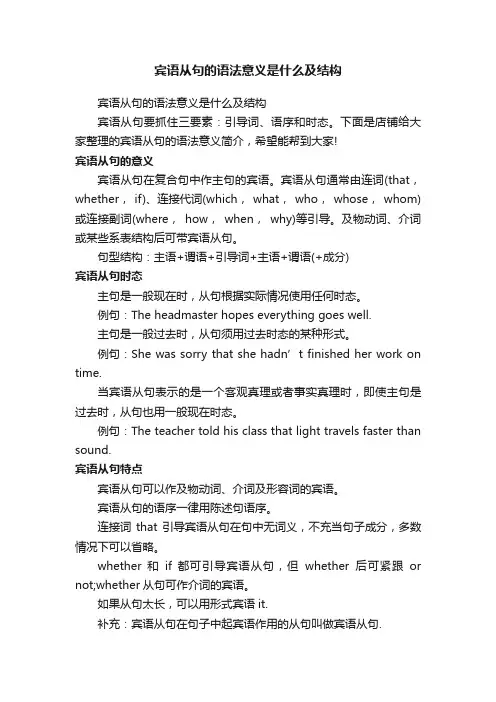
宾语从句的语法意义是什么及结构宾语从句的语法意义是什么及结构宾语从句要抓住三要素:引导词、语序和时态。
下面是店铺给大家整理的宾语从句的语法意义简介,希望能帮到大家!宾语从句的意义宾语从句在复合句中作主句的宾语。
宾语从句通常由连词(that,whether, if)、连接代词(which, what, who, whose, whom)或连接副词(where,how,when,why)等引导。
及物动词、介词或某些系表结构后可带宾语从句。
句型结构:主语+谓语+引导词+主语+谓语(+成分)宾语从句时态主句是一般现在时,从句根据实际情况使用任何时态。
例句:The headmaster hopes everything goes well.主句是一般过去时,从句须用过去时态的某种形式。
例句:She was sorry that she hadn’t finished her work on time.当宾语从句表示的是一个客观真理或者事实真理时,即使主句是过去时,从句也用一般现在时态。
例句:The teacher told his class that light travels faster than sound.宾语从句特点宾语从句可以作及物动词、介词及形容词的宾语。
宾语从句的语序一律用陈述句语序。
连接词that引导宾语从句在句中无词义,不充当句子成分,多数情况下可以省略。
whether 和if 都可引导宾语从句,但whether后可紧跟or not;whether从句可作介词的宾语。
如果从句太长,可以用形式宾语it.补充:宾语从句在句子中起宾语作用的从句叫做宾语从句.分类:宾语从句分为三类:(1)动词的宾语从句,介词的宾语从句和形容词的宾语从句.时态:1·主句用一般现在时,从句可用任意时。
2·主句用过去时,从句用过去某个时态。
3·主句用过去时,从句是真理时,只用一般现在时。
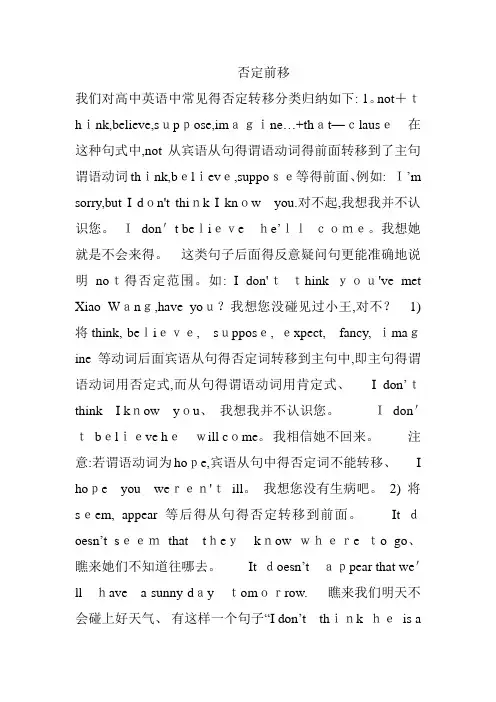
否定前移我们对高中英语中常见得否定转移分类归纳如下: 1。
not+think,believe,suppose,imagine…+that—clause在这种句式中,not从宾语从句得谓语动词得前面转移到了主句谓语动词think,believe,suppose等得前面、例如: I’m sorry,but I don't think I know you.对不起,我想我并不认识您。
Idon't believehe’llcome。
我想她就是不会来得。
这类句子后面得反意疑问句更能准确地说明not得否定范围。
如: I don'tthink you've met Xiao Wang,have you?我想您没碰见过小王,对不?1) 将think, believe,suppose, expect,fancy, imagine等动词后面宾语从句得否定词转移到主句中,即主句得谓语动词用否定式,而从句得谓语动词用肯定式、I don’tthink I know you、我想我并不认识您。
Idon'tbelieve hewill come。
我相信她不回来。
注意:若谓语动词为hope,宾语从句中得否定词不能转移、I hope you weren'till。
我想您没有生病吧。
2) 将seem, appear 等后得从句得否定转移到前面。
It doesn’t seemthat theyknow where to go、瞧来她们不知道往哪去。
It doesn’tappear that we'llhave a sunny daytomorrow. 瞧来我们明天不会碰上好天气、有这样一个句子“I don’t think heis agood doctor、”大家对这个句子有不同得翻译: 1、我不认为她就是个好医生。
2。
我认为她不就是个好医生、哪个正确呢?2就是正确得。
那么1得错误在哪儿呢?这就就是“否定转移”在作怪。
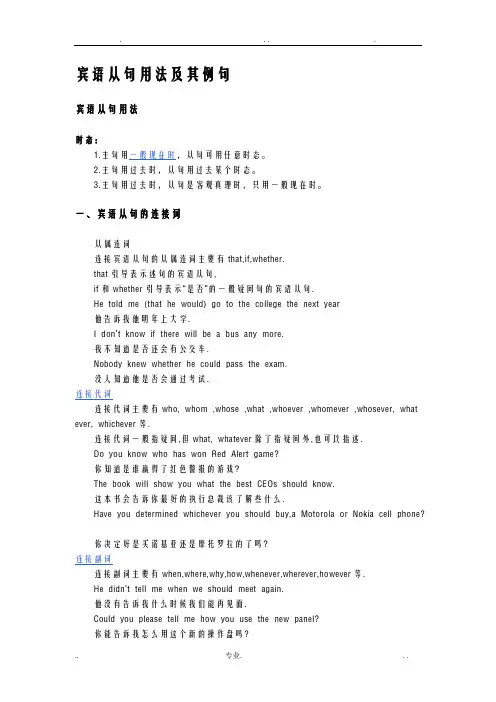
宾语从句用法及其例句宾语从句用法时态:1.主句用一般现在时,从句可用任意时态。
2.主句用过去时,从句用过去某个时态。
3.主句用过去时,从句是客观真理时,只用一般现在时。
一、宾语从句的连接词从属连词连接宾语从句的从属连词主要有that,if,whether.that引导表示述句的宾语从句,if和whether引导表示“是否”的一般疑问句的宾语从句.He told me (that he would) go to the college the next year他告诉我他明年上大学.I don’t know if there will be a bus any more.我不知道是否还会有公交车.Nobody knew whether he could pass the exam.没人知道他是否会通过考试.连接代词连接代词主要有who, whom ,whose ,what ,whoever ,whomever ,whosever, what ever, whichever等.连接代词一般指疑问,但what, whatever除了指疑问外,也可以指述.Do you know who has won Red Alert game?你知道是谁赢得了红色警报的游戏?The book will show you what the best CEOs should know.这本书会告诉你最好的执行总裁该了解些什么.Have you determined whichever you should buy,a Motorola or Nokia cell phone?你决定好是买诺基亚还是摩托罗拉的了吗?连接副词连接副词主要有when,where,why,how,whenever,wherever,however等.He didn’t tell me when we should meet again.他没有告诉我什么时候我们能再见面.Could you please tell me how you use the new panel?你能告诉我怎么用这个新的操作盘吗?None of us knows where these new parts can be bought.没有人知道这些的新的零件能在哪里买到.二、动词的宾语从句大多数动词都可以带宾语从句We all expect that they will win , for members of their team are stronger.我们都预料他们会赢,因为他们的队员更强壮.He told us that they would help us through the whole work.他告诉我们在整个工作中,他们都会帮忙的.部分“动词+副词”结构也可以带宾语从句I have found out that all the tickets for the concert have been sold out.我发现这场音乐会的所有票都卖光了.Can you work out how much we will spend during the trip?你能计算出这次旅行我们将花费多少钱吗?动词短语也可以带宾语从句常见的这些词有:make sure确保make up one’s mind下决心keep in mind牢记Make sure that there are no mistakes in your papers before you turn them in.在上交试卷前确保没有任何错误.可运用形式宾语it代替的宾语从句①动词find,feel,consider,make,believe等后面有宾语补足语的时候,则需要用it做形式宾语而将that宾语从句后置.I think it necessary that we take plenty of hot water every day .我认为每天多喝开水是有必要的.I feel it a pity that I haven’t been to the get-together.我没去聚会,感觉非常遗憾.I have made it a rule that I keep diaries.我每天写日记成了习惯.We all find it important that we (should) make a quick decision about this ma ter.我们都认为对这件事马上做出决定很重要.②有些动词带宾语从句时需要在宾语与从句前加it这类动词主要有:hate, take , owe, have, see to.I hate it when they with their mouths full of food.我讨厌他们满嘴食物时说话.He will have it that our plan is really practical.他会认为我们的计划确实可行.We take it that you will agree with us.我们认为你会同意我们的.When you start the engine, you must see to it that car is in neutral.开启发动机时, 一定要使汽车的离合器处于空挡位置.③若宾语从句是wh-类,则不可用it代替We all consider what you said to be unbelievable.我们都认为你所说的是不可信的.We discovered what we had learned to be valuable.我们发现我们所学到的东西都是有用的.三、介词的宾语从句用wh-类的介词宾语从句We are talking about whether we admit students into our club.我们正在讨论是否让学生加入我们的俱乐部.The new book is about how Shenzhou 6 manned spaceship was sent up into space.这本新书是关于神州6号载人航天飞船是如何升入太空的.用that,if引导的介词宾语从句有时候except,but,besides三个介词后可见到that引导的宾语从句I know nothing about my new neighbor except that he used to work with a p any.对于我的新邻居我只知道他曾在一家公司上班,其他一无所知.四、形容词的宾语从句常用来引导宾语从句的形容词有: sure,certain,glad,please,happy,sorry,afraid,satisfi ed,surprisedI am sure I will pass the exam.我确信我会通过考试.I am sorry that I have troubled you so long.很抱歉我这么长时间在打扰你.He is glad that Li Ming went to see him when he was ill.他很高兴在他生病的时候明能去看望他.五、if,whether在宾语从句中的区别①if和whether在作“是否”解时,引导宾语从句常放在动词know,ask,care,wonder,find o ut等之后,介词后一般不用if②少数动词,如:leave,put,discuss,doubt后的宾语从句常用whether.③whether后可以加or not,但是if不可以.④在不定式前只能用whether.(如:I can’t decide whether to stay. 我不能决定是否留下。
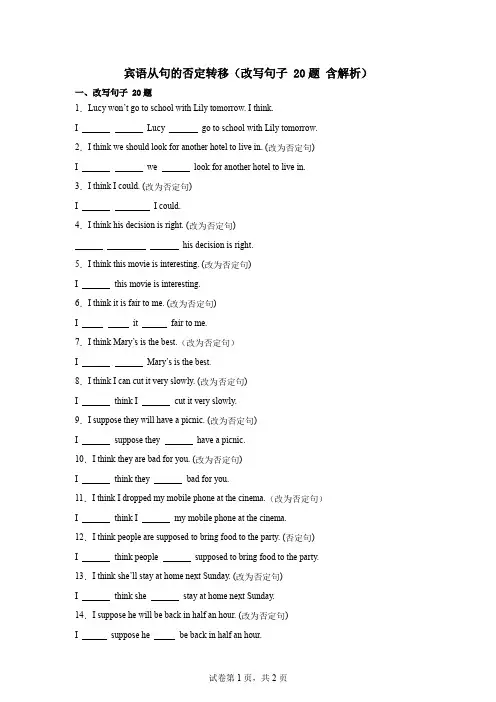
宾语从句的否定转移(改写句子 20题含解析)一、改写句子 20题1.Lucy won’t go to school with Lily tomorrow. I think.I Lucy go to school with Lily tomorrow.2.I think we should look for another hotel to live in. (改为否定句)I we look for another hotel to live in.3.I think I could. (改为否定句)I I could.4.I think his decision is right. (改为否定句)his decision is right.5.I think this movie is interesting. (改为否定句)I this movie is interesting.6.I think it is fair to me. (改为否定句)I it fair to me.7.I think Mary’s is the best.(改为否定句)I Mary’s is the best.8.I think I can cut it very slowly. (改为否定句)I think I cut it very slowly.9.I suppose they will have a picnic. (改为否定句)I suppose they have a picnic.10.I think they are bad for you. (改为否定句)I think they bad for you.11.I think I dropped my mobile phone at the cinema.(改为否定句)I think I my mobile phone at the cinema.12.I think people are supposed to bring food to the party. (否定句)I think people supposed to bring food to the party.13.I think she’ll stay at home next Sunday. (改为否定句)I think she stay at home next Sunday.14.I suppose he will be back in half an hour. (改为否定句)I suppose he be back in half an hour.15.I think he is a good player. (改为否定句)I think he a good player.16.I believe the internet becomes important. (改为否定句)I the internet becomes important.17.I think I am going to stay at home. (改为否定句)I think I going to stay at home.18.I think I can find a beautiful place to take photos. (改成否定句) I I can find a beautiful place to take photos.19.I think he can help you with your English. (改成否定句)I think he help you with your English.20.I believe that it will snow tomorrow. (改为否定句)I that it will snow tomorrow.参考答案:1.don’t think will【详解】句意:我认为,露西明天不会和莉莉一起去学校。
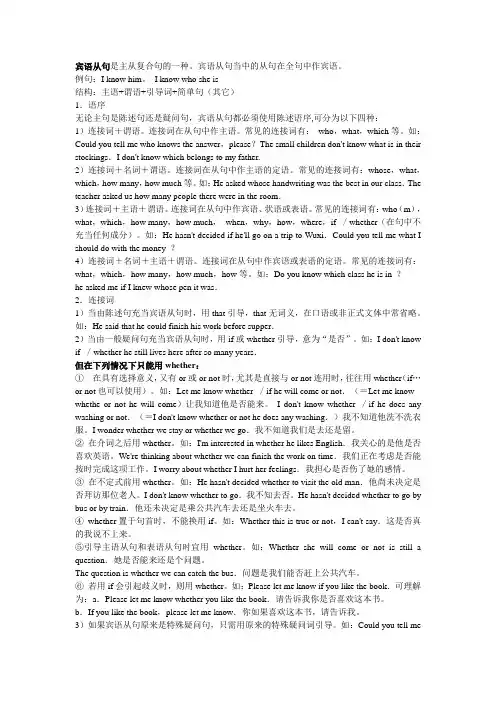
宾语从句是主从复合句的一种。
宾语从句当中的从句在全句中作宾语。
例句:I know him。
I know who she is结构:主语+谓语+引导词+简单句(其它)1.语序无论主句是陈述句还是疑问句,宾语从句都必须使用陈述语序,可分为以下四种:1)连接词+谓语。
连接词在从句中作主语。
常见的连接词有:who,what,which等。
如:Could you tell me who knows the answer,please?The small children don't know what is in their stockings.I don't know which belongs to my father.2)连接词+名词+谓语。
连接词在从句中作主语的定语。
常见的连接词有:whose,what,which,how many,how much等。
如:He asked whose handwriting was the best in our class.The teacher asked us how many people there were in the room.3)连接词+主语+谓语。
连接词在从句中作宾语、状语或表语。
常见的连接词有:who(m),what,which,how many,how much,when,why,how,where,if /whether(在句中不充当任何成分)。
如:He hasn't decided if he'll go on a trip to Wuxi.Could you tell me what I should do with the money ?4)连接词+名词+主语+谓语。
连接词在从句中作宾语或表语的定语。
常见的连接词有:what,which,how many,how much,how等。
如:Do you know which class he is in ?he asked me if I knew whose pen it was.2.连接词1)当由陈述句充当宾语从句时,用that引导,that无词义,在口语或非正式文体中常省略。

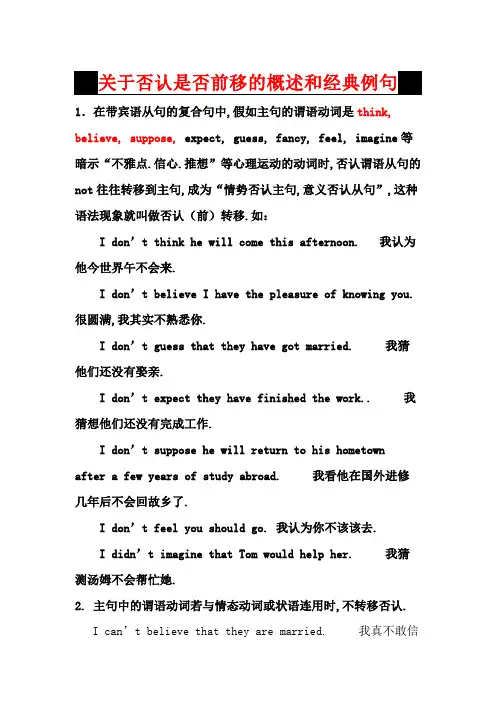
关于否认是否前移的概述和经典例句1.在带宾语从句的复合句中,假如主句的谓语动词是think, believe, suppose, expect, guess, fancy, feel, imagine等暗示“不雅点.信心.推想”等心理运动的动词时,否认谓语从句的not往往转移到主句,成为“情势否认主句,意义否认从句”,这种语法现象就叫做否认(前)转移.如:I don’t think he will come this afternoon. 我认为他今世界午不会来.I don’t beli eve I have the pleasure of knowing you. 很圆满,我其实不熟悉你.I don’t guess that they have got married. 我猜他们还没有娶亲.I don’t expect they have finished the work.. 我猜想他们还没有完成工作.I don’t suppose he will return to his hometownafter a few years of study abroad. 我看他在国外进修几年后不会回故乡了.I don’t feel you should go. 我认为你不该该去.I didn’t imagine that Tom would help her. 我猜测汤姆不会帮忙她.2. 主句中的谓语动词若与情态动词或状语连用时,不转移否认.I can’t believe that they are married. 我真不敢信任他们娶亲了.We can’t believe that he turns an honest penny. 我们不克不及信任他是用合法手腕挣钱. You mustn’t think he’s an honest person. 你不成以认为他是一个说谎的人.I didn’t ever suppose that they were happy. 我其实不认为他们是痛苦的.但是,在带有can’t和couldn’t的句子中,有时can’t和couldn’t带有否认转移的寄义.如:She can’t seem to do it. (=She seems not to be able to do it.) 她似乎不克不及做这件事.留意动词think, believe, suppose, imagine, expect,feel鄙人列情形下,否认不转移:(1) 这些动词跟其他另一个动词一路做并列谓语时,否认不转移.如:I believe and hope he won’t do that. 我信任并且也愿望他将不会那样做.I feel and admit that we are not foolish. 我认为并且也承认我们其实不愚昧.(2)用于疑问句时,否认不转移.如:Do you think it is not going to rain? 你认为天不会下雨吗?Don’t you believe that he has done a good thing? 岂非你不信任他做了一件功德?(3)用作拔出语时,否认不转移.如:Li Lei, I think, won’t be angry with you. 我想李蕾不会生你的气.Tom, I suppose, won’t be against it. 我猜测汤姆不会否决.Mike, I believe, hasn’t seen the film. 我认为迈克没有看这场片子.(4)动词前有其他副词润饰时,否认不转移.如:I really don’t think it’s necessary for us to go there now. 我的确不认为我们有须要去那儿. I feel strongly that he shouldn’t do such a thing. 我强烈地认为他不该该做那样的事. (5) 动词为非一般如今时或主语不是第一人称时,否认不转移.I thought that he wouldn’t come back soon. 我原认为他不会回来得这么快.She didn’t believe that he became a good boy. 她不信任他变成了一个好孩子.He thinks that he isn’t fit for the job. 他认为他不合适这件工作.He doesn’t believe that what we told him is true. 他不信任我们告知他的事是真的.(6) 当宾语从句中含的否认为not…at all, not a little, not a few, not enough, can’t help等固定搭配时,否认不转移.如:I think that he doesn’t know it at all. 我想他对那一点也不知道.I suppose that it is not enough to remember the wordsif you want to learn the language well. 我认为假如你想把这门说话学好,那么只记单词是不敷的.I believe that you can’t help singing our national anthem when you win the first place in the Olympic Games. 我信任当你在奥运会上获得第一名时你会不由自主地唱起国歌来.(7)当宾语从句中含no, nothing, nobody, nowhere, hardly, seldom, little, few等否认词或半否词时,否认不转移.如:I believe that nothing can make me give it up. 我想任何工作也不克不及使我废弃.I think that no one can escape if the ship sinks inthe sea. 我认为假如这艘船沉入海底的话,那么谁也逃不失落.I suppose that he is a man of few words.我猜测他是一个言语不久不多的人.3.当think用在疑问句中时,不转移否认.Why do you think I c an’t change your note? 你为什么认为我换不开你的钞票呢?4.由knew, fear, mean, I am afraid等动词情势组成的宾语从句中,其否认词not,平日不进行否认转移.当然,这其实不是说否认词not不克不及否认以上动词情势,而是说否认宾语从句和否认主句谓语动词的意思不合.试比较:He knew you wouldn’t tell on him. 他知道你不会出卖他.He didn’t know you should tell on him.他没想到你竟会出卖他.I mean you didn’t do it right. 我是说你做得不合错误.I don’t mean you did it right. 我其实不是说你做的对.I am afraid that he won’t threaten me with death.生怕他不会以逝世来威逼我.I am not afraid that he will threaten me with death. 我不怕他以逝世来威逼我.5.动词hope不成进行否认转移.I hope it won’t snow. 我愿望天不下雨.I hope she doesn’t dislike the flowers. 我愿望她不会憎恶(会爱好)这些花.6.鄙人列几种情形下,think的宾语从句中的否认词平日不成前移到主句中:1)宾语从句中有固定短语,如can’t help, not at all,not only… but also… 等.I think everybody can’t help laughing if t hey see it. 我认为,人们看到时会禁不住大笑.I think she is not only beautiful but also kind.我认为,她不但英俊,并且仁慈. 2)宾语从句中not与just, enough, quite, much等副词连用.如:I think you are not quite sure about it. 我认为,你们对这一点其实不克不及完整确定.I think she’s not much like her mother. 我认为,她不怎么像她的母亲.3)宾语从句中含有no, nothing, never, nobody等.如:I think she has never been there. 我认为,她从未去过那边.4)think本身有其他词润饰或与其他动词组成并列谓语.如:I sometimes think he is not an honest man. 我有时认为他其实不说谎.I do think you shouldn’t hurt her. 我的确认为你不该损害她.I think and hope that I’m not disturbing you so much. 我认为,也愿望,我不太打搅你. 5)think以曩昔时.完成时等消失,则不一定请求否认前移.如:I was thinking that he wouldn’t succeed. 我在想他不会成功.I thought you didn’t marry her. 我原认为你不会与她娶亲.I had thought he wouldn’t come. 我同意为他不会来呢.但是,在现代英语中,为了使语气严厉,曩昔时态的句子中偶然也可见到这种否认转移.如:I don’t think this man would want to hurt me. 我想,这小我不会损害我.6)think的主语不是I或we,而是其它人称.如:They think she will not come. 他们认为她不会来. 7.在现代英语中,下面两句都可以说:I don’t think he will succeed.I think he won’t succeed. 我认为他不会成功.。
所谓“宾语从句的否定前置”,是指如果带有否定的宾语从句,宾语从句中的否定词通常提前,用来否定主句的谓语动词。
一、当主句谓语动词是think,believe,feel,guess,expect,suppose,imagine等表示“观点、信念、推测、臆测”等心理活动时,常常使用这种结构。
I don't think I know you.我想我并不认识你。
I don't think he has visited the island.I don't expect it will rain tomorrow.He doesnt think his neighbor will help him if he is in trouble.二、这种结构的反意疑问句主语和谓语动词必须与宾语从句中的主语和谓语动词保持一致。
I don't think he is a good swimmer, is he?否定前移时的反义句是高考的考点。
当主语为第一人称I, we时,通常反问的是从句;而当主语不是第一人称时,则反问主句。
如:I dont think Jim will pass the exam, will he?Tom doesn't believe that his parents will be in support of his plan, does he?三、在下列情况下不使用否定前置:1)若谓语动词为hope,宾语从句中的否定词不能转移.I hope you weren't ill. 我想你没有生病吧。
2)主句的谓语动词用于一般现在时以外的事态.I thought she didn't finish her homework.3)主句的谓语前有do,does,did表示强调时。
We do think our team won't fail in the game.4宾从no,nothing,no one,nobody,none,hardly,seldom.never,few,little 等半否定词时。
宾语从句中否定提前。
在宾语从句中,当主句的谓语动词为think,believe,expect(盼望),imagine(想象),suppose(设想)等时,从句不用否定形式,而在主句上否定。
例如:I don't think I know you.我认为我不认识你。
I don't believe he can pass the exam.我认为他考试不会及格。
I don't expect you will be late tomorrow.我希望你明天别迟到。
实际上,英文的表达形式较委婉,这类句子还常用于反意2.Not…….because …..如果not 否定的是because 引导的整个从句,则把not 迁移到主句的谓语动词上,并不用逗号隔开,意为“并不是因为。
就。
”she didn’t go to the film because he like it.如果用逗号隔开否定的是,则否定的是其后的谓语动词。
He didn’t go to the film, because the he was ill.3当happen/used to/seem等后加不定式构成复合宾语,如果不定式构成复合宾语,如钩不定式构成否定意义,not前移到这些词前,构成“not happen/used to……..”the news don’t seem to be true.3 .在”apprear/seem/feel like/look/feel as if +从句“的结构中。
从句的否定通常移到这些动词和短语前面。
It doesn’t look like he is a Chinese.4.在“it was likely/probably+从句”, 如果从句用否定,则把否定移到谓语动词前.It isn’t likely it will rain tomorrow.。
Unit2语法,知识点,写作背默语法精讲现在完成时(二)1.have/has gone to和have/has been to的用法。
(1)have/has gone to意为“到某地去”,说话时该人不在现场,一般不用第一、二人称作句子的主语。
例如:—Where is Jim?吉姆在哪里?—He England.他去英国了。
(尚未回来)(2)have/has been to意为“曾经去过某地”,现在已不在那里了,后可接次数,如once,twice,three times等,表示“去过某地几次”,也可和just,never,ever等连用。
例如:My father Beijing twice.我父亲去过北京两次。
此外,have/has been in表示“在某地待了多长时间”,常与表示时间段的状语连用。
例如:I Shanghai for three years.我到上海已有三年了。
2.延续性动词和非延续性动词。
动词按动作发生过程的长短, 分为延续性动词和非延续性动词1. 延续性动词的用法:延续性动词表示的动词是一种可以延续一段时间的动作。
如:learn, work, stand, know, walk, keep, have, wait, watch, sing, read, sleep, live 等。
这一类动词常与表示一段时间的时间词连用。
e.g. 我学习英语已经8 年了。
I English for eight years.2. 非延续性动词的用法非延续性动词表示的动作不能延续, 即动作发生立即结束。
如:leave, start, set out, arrive, reach, get to, begin, stop, shut, turn off, marry, put, put on, get up, wake, fall, join, finish, end, become, come, go, die, close, open, break, give, jump, buy, borrow 等。
宾语从句中的否定前移教学分析:中学英语中的否定前移是宾语从句的一个典型句式,也是高中英语教学中必然会强调的一个句型。
因此,在初中学懂,打好基础很重要。
初中阶段,宾语从句中的否定前移对学生来说既是一个重点,又是一个难点,否定前移形式上否定主句,意义上否定从句,学生更是很难理解,掌握。
因此在上课过程中主要通过例句进行讲解。
教学目标:让学生理解并掌握宾语从句否定前移的用法。
教学难点:让学生理解并掌握宾语从句否定前移的用法。
教法设计:讲练结合及例句演示教学过程:Step I导入1.翻译句子:I don’t think it would be safe to do my homework on a bicycle.正:我认为在自行车上写作业不安全。
误:我不认为在自行车上写作业安全。
2.概念:根据语法的惯例,当主句是I/We think,suppose,believe,imagine,guess等时,其后的宾语从句如果是否定句,要把否定转移到主句的think等动词上,这叫做“否定前移”或“否定前置”。
例如:I don’t believe that man is from China.【设计意图】翻译导入,学生会出现两种不同的翻译,由此引出宾语从句中的否定前移,激发学生学习兴趣。
再通过例句,给学生给出什叫做“否定前移”,降低学习难度。
Step II用法概括1.为什么要否定前移翻译句子:I don’t think it would be safe to do my homework on a bicycle.正:我认为在自行车上写作业不安全。
误:我不认为在自行车上写作业安全。
当翻译成“我不认为”表达很直白,翻译成“我认为”,语气感受很委婉2.适用否定前移的情况I don’t think he is right.我认为他不对。
We don’t except that he will tell the truth.我们想他不会说出真相的。
动词think后的从句一定要否定前移吗?云南省昭通市威信县第二中学杨天喜(657900)在人教版高中英语必修三(p18)有这么一个句子:I don’t think it’s very funny.大家都知道,这是一个典型的否定前移的句子。
在宾语从句中,若主句谓语动词是think, believe, suppose, expect, guess, fancy, feel, imagine等表示心理活动的动词时,宾语从句不能用否定形式,若宾语从句是否定句式,则常将否定词not前移到主句谓语动词前面,从而形成“形式上否定主句,实际上否定宾语从句”的现象,这种语法现象叫做否定前移。
但是必须注意的是:这种特殊句型的主语一定是第一人称I或者we,若是第二三人称代词(不论单复数)做句子主语,便不能形成否定前移。
如:I don’t think he will come this afternoon.我认为他今天下午不会来。
What a pity! I don’t believe I know you. 很遗憾,我并不认识你。
I don’t guess that they have got married. 我猜他们还没有结婚。
I don’t expect they have finished the work.我料想他们还没有完成工作。
I don’t suppose he will return to his hometown after a few years of study abroad.我看他在国外学习几年后不会回家乡了。
I don’t feel you should go.我觉得你不应该去。
I didn’t imagine that Tom would help her.我猜想汤姆不会帮助她。
任何语法规则都有例外,如果属于下列情况,则不进行否定前移:1.主句中的谓语动词若与情态动词或者副词连用时,不否定前移。
根据语法的惯例,think, suppose, believe, imagine, guess 等后的宾语从句如果是否定句,要把否定转移到主句的think等动词上,这叫做“否定前移”或“否定前置”。
如:I think you can not go there by bus. (误)
I don’t think you can go there by bus.(正)
我认为你不能乘坐公共汽车去那儿。
在冀教版九年级课本第25课课文中,有这么一句话:“I thought you didn’t have any money.”该句是一个宾语从句,从句中的否定没有转移到主句中。
这是为什么呢?是不是还有其他情况下否定不前移呢?笔者经过翻阅若干本英语参考书及工具书,总结出以下情况下think 等词后的宾语从句的否定不能转移到主句think动词上。
① think 是完成时态或完成进行时态时;
如:I have been thinking that we should not take his advice.
我一直认为我们不应该听他的话。
② think 是一般过去时或过去进行时态时;
如:We thought that this book was not worth reading.
我们认为这本书值得一读。
③ think 前有副词修饰的时候;
如:I almost think you are not my son’s teacher.
我差点认为你不是我儿子的老师。
④ think 前有do, did 等词强调时;
如:I do think that she is not pretty at all.
我确实认为她不漂亮。
⑤ think 用于一般疑问句或特殊疑问句中;
如:Do you think he will not join the Party?
你认为他不会入党吗?
Why do think we can’t beat you?
你们怎么认为我们打不赢你们呢?
⑥当think后的宾语从句中含有no, never, nothing, nobody等否定词时;
如:I think she may have nothing to do today.
我认为她今天没事干。
⑦当think 用作插入语时;
如:Your sister ,I think, is not a friendly gay.
我认为你妹妹不太友好。
⑧当think后的宾语从句中含有not at all, not a little, not enough, can’t help doing 等固定词组时;如:I think you can’t help laughing when you hear the joke.
我认为你听到这个笑话时会忍不住笑的。
⑨当think和另一个动词构成并列谓语时;
如:I think and hope you won’t feel sad even if you lose the match.
我们认为也希望,即使您们输掉了比赛,你们也不会伤心的。
⑩当think用作虚拟语气的谓语had thought, 表示“本来认为……”时;
如:I had thought that he hadn’t come here.
我本来认为他不来了呢。